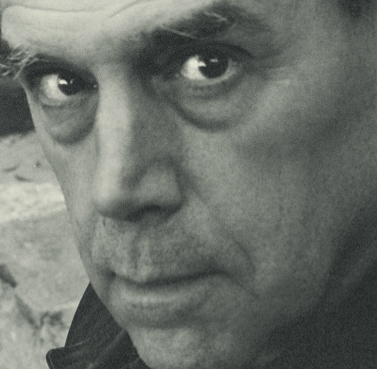BITTER EARTH
2016iDEAL 129
Photo © Ursula Scherrer
Limited edition LP on white vinyl, released by iDEAL
THE HOUSE ON HIGHLAND AVENUE
John Duncan vocals
Oren Ambarchi guitar + fx
Joe Talia drums + synth
RED SKY
John Duncan vocals
Backing vocals by Leif Elggren, Marja-leena Stillanpää, Carl Michael von Hausswolff, France Jobin, Tom Recchion, Elàn Garfias, Christopher James, Eve Muller, Liane Shirmer, Vetza
WILD IS THE WIND
John Duncan vocals
Eiko Ishibashi piano
Jim O'Rourke electric bass
ENDLESS SEA
John Duncan vocals and breaking glass
Backing vocals by France Jobin and Danny Gromfin
Aurora borealis emissions recorded by Rob Stammes
Nisi Jacobs electric bass
DARK
John Duncan vocals
COMIN' BACK TO ME
John Duncan vocals, electronics and field recordings
Giori Politi percussion
WALK ON GILDED SPLINTERS
John Duncan vocals
Backing vocals by Oana Avasilichioaei, Eric Boivin, John Duncan, James Hamilton, France Jobin, Frèdèrick Maheux, Keith McMullen
AUTUMN SERENADE
John Duncan vocals
Chris Abrahams piano
Ace Farren Ford chinese suona
REACH OUT
John Duncan vocals and piano
GENIUS! -- Joachim Nordwall
very strange... -- Eric Duboys
Not nearly as bad as I expected -- Gary Jo Gardenhire
BITTER EARTH is the much anticipated, long-in-the-making new album from John Duncan joined by a broad cast of adroit collaborators: Oren Ambarchi, Jim O'Rourke, Smegma, Chris Abrahams, Joe Talia, CM Von Hausswolff, Eiko Ishibashi, France Jobin - all written in dedication to Mika Vainio (who, for avoidance of doubt, is not dead!). It's a remarkable suite of cover versions - from The Gun Club to Nina Simone and Iggy Pop - and original material by an arch experimenter who continues to explore unfamiliar territory...
We're no experts on Duncan's oeuvre, but this record flips our previous assumptions on their fleshy bonce, taking in a sweltering, almost cinematic psych version of The Gun Club's The House On Highland Avenue along with his own original, gospel-like spiritual Red Sky and capped off with an achingly intimate solo piano twist on The Four Tops' Reach Out.
The effect is most often shocking in the sweetest way, especially if you're more familiar with his esoteric work mapping the Nazca Lines for Planam or the indescibable breadth of his First Recordings 1978-85 V.1.2 box set, for example.
Perhaps it's an exercise in catharsis after so many years of heavy drones and outsider experimentation, or perhaps it's intended to draw a perpendicular connection between that work and pop/folk/jazz idioms. But, either way, his cracked, naked voice is utterly captivating, whether accompanied by shivering tambourine in a take on Pere Ubu's Dark or transporting Jefferson Airplane's Comin' Back To Me to a scene of cicadas and lilting, metallic drums and electronics somewhere between Tel Aviv and Bologna.
A timeless record we reckon you'll return to over and again. Highly recommended!
--Boomkat
The singing voice of John Duncan is akin to an amplified whisper, its untrained sensibility expressing an undeniable will to keep that vital pulse going. It is also a fundamental component in the reconstruction of stages of one's past that have caused unforgettable emotions; it's not important if those feelings were deriving from joy or sorrow. Still, the cognoscenti know that Duncan never enjoyed a veritable "tranquil" existence, his development indelibly marked by dramatic events, uncomfortable choices and abrupt changes imbued with a severe awareness of human limitations. A similar intensity permeates this music, although differently dressed.
Returning to an old song is often symptomatic of a refusal of what's being endured in the present, a tentative retrieval of bygone sensations and scents to repel the dictatorial grip of anguish. Or, to quote the man himself, a desperate attempt to "stay alive". By covering the songs gathered in Bitter Earth and This Bitter Earth Duncan deals with the basis of his musical learning in artistically significant fashion. He precisely draws a "line of taste", but at the same time completely transforms the very essence of each piece tackled. The tunes are at times covered by a disfiguring mud, elsewhere caressed with frail hands, Duncan's perceptions appearing profound and uncontaminated all the way through. We could talk about the diversity of styles, but there's no actual "style" involved; it's more like trying to figure out why erstwhile promises of improvement revealed themselves to be the soundtrack of an increasingly unmanageable pain.
The collaborators (among others, Oren Ambarchi, Jim O'Rourke, Tom Recchion, France Jobin, Chris Abrahams, Carl Michael Von Hausswolff) are beautifully attuned to the visions evoked by these renditions; the lone track authored by Duncan is a short cathartic gospel called "Red Sky". Pere Ubu to Dr. John, Jefferson Airplane to Iggy Pop: the variety of illustrious references is impressive, and the versions will startle most receptive listeners. This reviewer's favorite moments come from the piano tracks. An extraordinary "Wild Is The Wind" – made famous by Nina Simone – where Eiko Ishibashi and O'Rourke (on bass) turn grievousness into shimmering droplets of melancholy around Duncan's trembling tone. Then, "Autumn Serenade", Abrahams' chords emphasizing the shadows of a forlorn sunset, with the gift of a poignant Chinese suona solo by Ace Farren Ford on top of everything.
Massimo Ricci, Touching Extremes
